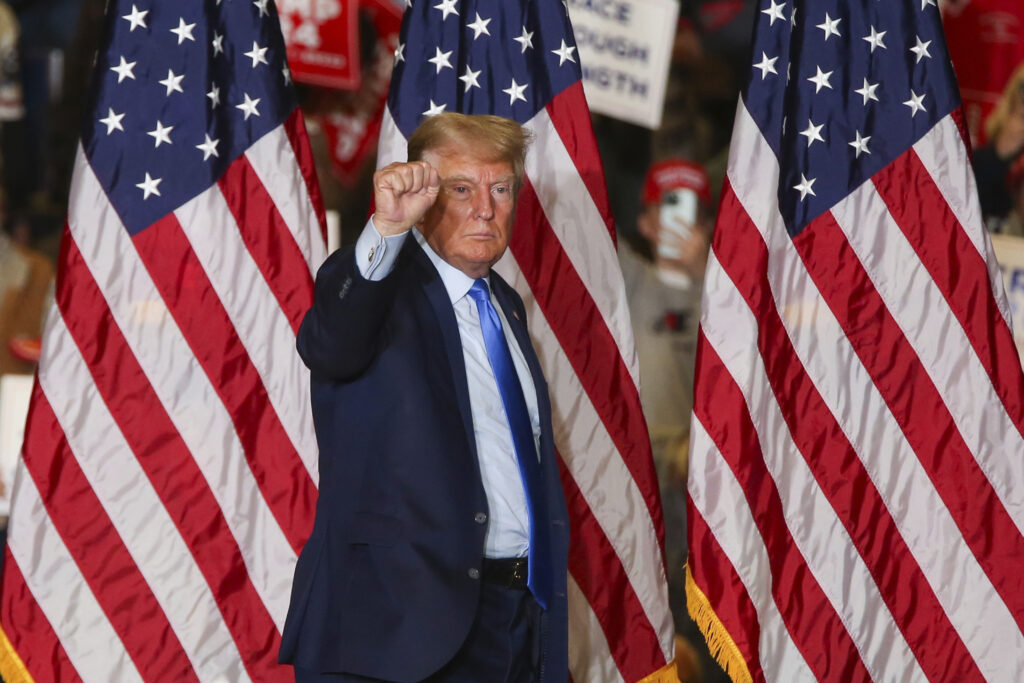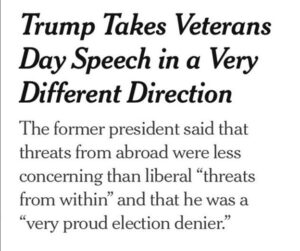Elections
OPINION: Why are the Haley Civil War comments getting more coverage than Trump’s vermin rant?

After mostly ignoring Trump’s incendiary vermin rant last month, the media is aggressively covering Nikki Haley’s abhorrent Civil War comments this week. While there have been some missteps, it is encouraging to see more attention being paid to this kind of extremism.
But why Haley? Why now? Nearly every day, Donald Trump vomits up similarly outrageous and even more dangerous things, without getting this kind of immediate and widespread coverage.
Make no mistake, the Haley “Civil War” comments are vile. Here’s a clip of what she said in New Hampshire on Wednesday, when asked by a member of a town hall audience, “What was the cause of the Civil War?”
This shocking exchange quickly ricocheted across social media. In less than 12 hours, it was the top story on Google News, still trending on social media and prominent on the homepages of much of the legacy media that either delayed or downplayed reporting on Trump’s vermin comments. Three days later, the coverage and commentary continue.
As we see this sustained media attention of Haley’s states’s rights philosophy, I think we need to ask why this story — as despicable as it is — is blowing up when Trump gets such different treatment for diatribes promising to create concentration camps, to tear the country apart with mass deportations, and doubling down on Hitler’s claim that some people are “poisoning the blood of our country.”
One reason for the coverage of Haley’s comments is, of course, the topic: “Was the Civil War about slavery” hits a lot of hot buttons. It’s also because Haley is moving up in the polls in New Hampshire where this incident happened. Sadly, the extensive coverage may also be because there’s not that much other news during the week between Christmas and New Year’s Day. But I think it’s a big story no matter what the reason or the timing.
That said, I also think it’s a bigger story when a former president and current GOP presidential frontrunner says inaccurate, racist, incendiary, crazy and dishonest things. But despite the steady stream of such comments from Mr. Trump, he often gets a pass. His “Hitler moment” last November — you know, the one where he describes the majority of Americans as “vermin,” — showed up in print in only one legacy newspaper, and the multiple nationally broadcast news programs aired a total of three minutes of coverage in the first week following the comments. Three minutes.
I’ve struggled to understand the pass this dangerous man is getting from journalists. I now think there are four reasons for it.
- First, Mr. Trump has managed to normalize his behavior. Reporters no longer consider it news when he breaks with the norms of behavior and promises terrible cruelty. They seem to think it’s already baked into the Trump brand, and therefore no longer newsworthy.
- Second, reporters are bored with all things Trump. This one takes a bit of digging to see, and it also requires you to make a distinction between journalism and social media. The plain fact is that Trump is (finally) no longer dominating news coverage. There are fewer stories about him across the media, and having been burned for years, fewer breathless stenographers eager to tell us of Mr. Trump’s latest promise.
- Third, reporters remain stuck in a world where there are two normal parties and the same rules hold both to account. They report that Congress failed to do something, when it would be more accurate and fairer to say Republicans blocked Congress from doing that thing. This outdated mental model of our politics bleeds into the coverage of presidential candidates, and of the presidency itself. It explains the reluctance to give Joe Biden the credit he has earned for his accomplishments, and the habit of covering Mr. Trump as if he’s a normal politician.
- Fourth, there’s a failure of imagination. Reporters, like many Americans, are simply unable to see the very real threat Trump poses not just to them as journalists but to our entire country, if not the whole world. This failure leads to misleading headlines like this from the venerable New York Times, where “a very different direction” stands in for “Nazi rally.”

Of course, there has been some thoughtful, in-depth coverage of the Trump threats. But these stories should not be behind a paywall. It would be smart to stop brushing off the dangerous threats Trump makes in his near daily campaign diatribes and social media posts. Media critic Jon Allsop suggests practicing basic journalism: “…Taking at least a step toward more accurate coverage of Trump and the threat he poses should be easy—increasingly, it only requires reporting what he himself is pledging to do and has already done, and describing it directly and honestly…”
Mark Jacob argues for a stronger stand from editorial pages including page one editorials. Jacob also sees a need for a Walter Cronkite or Edward R. Murrow moment from high-profile broadcasters. I think it’s also key to stop pretending that Trump is a normal candidate by giving him high-profile interviews and prime-time town halls.
The coverage this week of the Haley Civil War uproar has been solid. But the overall news reporting and analysis of Republican extremism — particularly of Trump — is not meeting the moment.
Journalists are running out of time to fix that.
Jennifer Schulze is a former Chicago journalist who talks media every month on WCPT 820AM on “Live, Local & Progressive with Joan Esposito” with former Chicago Tribune editor Mark Jacob. You can follow her on Threads @jenniferschulzechi or Twitter/X @NewsJennifer.
